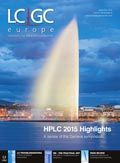14th International Symposium on Hyphenated Techniques in Chromatography and Separation Technology (HTC-14)
The 14th International Symposium on Hyphenated Techniques in Chromatography and Separation Technology (HTC-14) will be held from 27–29 January 2015 in Ghent, Belgium.
The 14th International Symposium on Hyphenated Techniques in Chromatography and Separation Technology (HTC-14) will be held from 27–29 January 2015 in Ghent, Belgium. The symposium is organized under the auspices of the Royal Flemish Chemical Society (KVCV) in collaboration with the Royal Society of Chemistry (RSC) and will cover the latest developments in hyphenated chromatography and related separation techniques.
(Photo Credit: Erlend Robaye - Erroba/Getty Images)

Topics to be covered include automation, advances in ultrahigh-pressure LC and multidimensional LC–MS techniques, new technology advances in GC×GC and supercritical fluid chromatography (SFC), and hyphenated sample preparation techniques. Application challenges encountered in (Petro)Chemical, (Bio-)Pharma, Food, and Biotech industries will be discussed. Furthermore, the programme incorporates keynote and tutorial lectures on high-peak capacity separations, new method development strategies and detection possibilities, and advances in column technology.
HTC-14 is expected to bring together over 250 scientists from around the world, with expertise in chromatography, spectroscopy, clinical and pharmaceutical analysis, forensics, chemometrics, (petro)chemicals, column technology, environmental analysis, food analysis, “omics”, and polymer analysis. Three sessions will be run in parallel over the three days and will feature presentations by internationally renowned experts from industry and academia.
Plenary lectures will be given by Prof. Jim Jorgenson, the inventor of UHPLC and CE (University of North Carolina, United States); Prof. Alexander Makarov, the inventor of the Orbitrap MS (Thermo Fisher Scientific, Germany); and Dr Koen Sandra, renowned expert in biopharma analysis and metabolomics LC–MS profiling (Research Institute for Chromatography, Belgium). Other sessions include dedicated sessions for “Separation Sciences in Industry: Technology and Applications” and “Battle of the Gurus: Q&A with your Heroes in Chromatography”.
CALL FOR ABSTRACTS
Participants are invited to register and submit abstracts for review. Out of the submitted proposals, a limited number of oral communications will be selected by the Scientific Committee. The others will have the opportunity to be presented as a poster. Participants wishing to present an oral communication or a poster should submit abstracts using the abstract submission menu available on the website www.htc-conference.com. The deadline for abstract submission for oral presentations is 15 September 2015. The deadline for abstract submissions for posters is 1 December 2015.
AWARDS
There are a number of awards that will be presented at HTC-14. The Knox Medal will be awarded by the Royal Society of Chemistry (RSC) and honours individuals who deserve special recognition for their innovation or influential work in the field of separation science. The Lifetime Achievement Award, sponsored by LCGC Europe, will be offered for “outstanding achievements in hyphenated chromatographic techniques and for distinguished service to the international chromatographic community”. The most innovative contribution will receive the HTC-Award sponsored by Elsevier Science. The three most innovative poster contributions will receive the HTC-Poster Award.
Website: www.htc-conference.com • E-mail: nadia@ldorganisation.com

Characterizing Plant Polysaccharides Using Size-Exclusion Chromatography
April 4th 2025With green chemistry becoming more standardized, Leena Pitkänen of Aalto University analyzed how useful size-exclusion chromatography (SEC) and asymmetric flow field-flow fractionation (AF4) could be in characterizing plant polysaccharides.
Investigating the Protective Effects of Frankincense Oil on Wound Healing with GC–MS
April 2nd 2025Frankincense essential oil is known for its anti-inflammatory, antioxidant, and therapeutic properties. A recent study investigated the protective effects of the oil in an excision wound model in rats, focusing on oxidative stress reduction, inflammatory cytokine modulation, and caspase-3 regulation; chemical composition of the oil was analyzed using gas chromatography–mass spectrometry (GC–MS).








